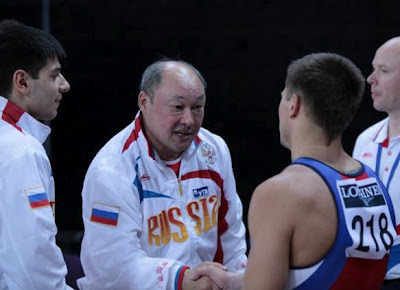National men's team coach Valery Alfosov, and Head Coach Andrei Rodionenko have both given recent interviews about selection of the men's team for the forthcoming Olympics. I'm providing below a summary of the key points:
 |
| National team coach Valery Alfosov confers with Anton Golotsutskov at this year's European Championships in Montpellier. Picture courtesy of the RGF. |
- Rodionenko emphasised that Europeans and the Olympics are two different competitions - some of the gymnasts seen in Montpelier will make the journey to London, but not all.
- Results of the European Championships and Russian Cup will form only part of the decision making process which will also include subsequent control competitions.
- Alfosov said that there is only a very short space of time between Europeans and Russian Cup for the men. It is difficult to recover and prepare properly for so many consecutive competitions, and it’s to be expected that maybe not all of the gymnasts present at Europeans will also start at Russian Cup.
- Ignatiev, Khorokhodin and Pakhomenko all missed out on European berths because they could not contribute specialist scores, but they are still candidates for the Olympic team.
- Alfosov said he was satisfied with the work presented in Montpellier, mentioning in particular Ablyazin’s 7.2 SV on vault and Emin Garibov’s SV of 7.2 on high bar, which is only exceeded by some of the Chinese. This represents a significant improvement in the short space of time since the 2011 Tokyo World Championships. He described these two boys, and Balandin, as 'hard workers'.
- Rodionenko suggested that Balandin's place on the team was won in competition with Russia's 'other' rings specialist, Pluzhnikov - there is some suggestion that Balandin might be required to do pommels in London (?).
- Alfosov is a great admirer of Denis Ablyazin's work, and commented favourably on his decision to risk a higher SV in floor finals : 'In qualifying, he showed the floor exercise with a base value of 6.9. He performed well and reached the final with the best result, where the coach and athlete decided to take a risk and increase the complexity of the program. But I for one really like it when coaches are not afraid to take risks to prove the superiority of an athlete. You're right that the tournament Denis failed with this combination, but he showed that he is able to do it. And we think about how to get it to the Olympics and compete for a medal.’
- As regards Golotsutskov's inconsistent form at this competition, Rodionenko refers to him as having made his ‘first mistake in 8 years’. Alfosov explains that he took time off after Tokyo to recover and has yet to regain his best competitive form. He is ‘still one of the contenders to hit the Olympic team.’ His mistakes might motivate him to do better. Rodionenko says he will be in Penza to prove his worth.
- Alfosov says that they expect both Belyavski and Garibov to be able to contend for medals in the all around in London. In Montpelier, Rodionenko adds, Belyavski was struggling with an injury in his 'collar' (shoulder?).
Best of luck to the Russian Team
ReplyDelete